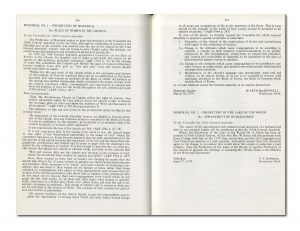While women were officially allowed to enter into the ministry and eldership as of 1966, the conversation and debate around the ordination of women did not cease. Women were subjected to jokes and crude remarks, facing discrimination as some Churches tried to get exemptions from the new Act. At a Pre-Assembly workshop in May 2016, Rev. Linda Ashfield recalls her own experience with discrimination. She says, “I was certainly not prepared for the anger, the anonymous hate mail that was slid under my door at night, or posted on the bulletin boards all over East House and within the academic wing. I wasn’t prepared for the hurtful things that were said, the mean innuendos and the put downs and dismissive comments.”
These sorts of experiences are what led the 1979 General Assembly to create a committee called Memorial #1, as result of the request that came from the Presbytery of Montreal, in an attempt to end the discrimination. This committee was formed to address the attitudes that caused congregations to be unwilling to consider a woman as minister or elder, and to change church language and terminology to be more inclusive to women.
Video courtesy of Knox College
By 1981, there were approximately 50 female ministers and more elders, but at the same time some people still petitioned and dissented over allowing women to be ordained. These petitions dealt with things such as asking to guard people from undue pressure to conform to practices not deemed imperative in scripture. Two specific petitions resulted in the creation of a task force. The Presbytery of West Toronto petitioned for a task force for more clarity on the subject and the Presbytery of Glengarry asked for a repeal of ruling. The Special Task Force on the Liberty and Conscience as it pertains to the Ordination of Women was created as a result of these issues. After meeting over a period of 6 months, they determined that “the corporate decision of 1966 must be respected by the church,” effectively cementing women’s place in the Church, and their right to be ordained.
``The Corporate decision of 1966 must be respected by the Church.``
